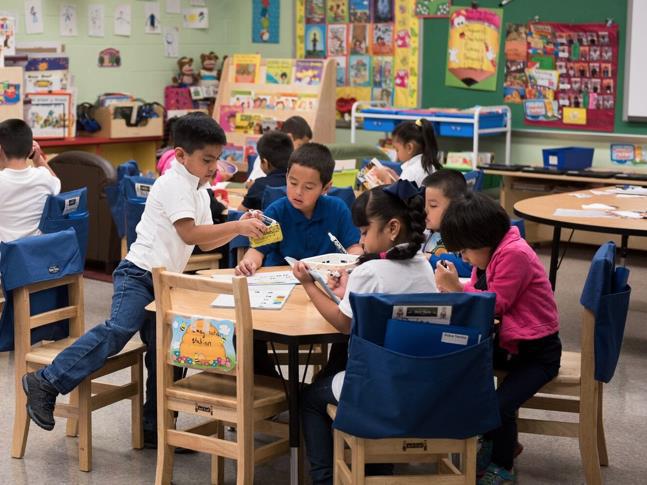Making School More than Academics
Topics

When educators design and create new schools, and live next gen learning themselves, they take the lead in growing next gen learning across the nation. Other educators don’t simply follow and adopt; next gen learning depends on personal and community agency—the will to own the change, fueled by the desire to learn from and with others. Networks and policy play important roles in enabling grassroots approaches to change.
Two principals led their middle school teams on a journey to intentionally foster social-emotional growth in their students: making school into an experience beyond academics.
In our schools, it’s not uncommon to hear students start discussions with “I see your point of view, and I respectfully disagree. Here’s why.” Or, to see students engaging in random acts of kindness. Our middle school students are thinking about what they post on social media, talking to each other about hurtful name-calling in gym class, and openly asking for guidance from their parents. How did we cultivate environments that encourage this behavior? By nurturing the social-emotional growth of our students.
A couple of years ago, both of us looked at our schools and wondered: how did we arrive at a place where academics superseded any other kind of education? We knew academic achievement and social emotional development were not diametrical opposites. Social-emotional learning underpins scholastic success, understanding what it takes to be a good citizen and becoming a successful adult. We knew we had to find intentional approaches that honored that philosophy. After all, it is part of the promise we made as educators.
So, we embarked upon a journey to intentionally foster social-emotional growth in our students. It was a natural fit as both of our schools were involved in next generation learning efforts and looking at changes to how ‘school is done.’ The work and effort required to get where we are today were well worth it, and we’re excited to share the progress we’ve made.
Here’s what making school into more than academics looks like in our two buildings:
Conrad Ball Middle School
We implemented a ‘Plus’ schedule that carves out specific time in our building for students to engage in social-emotional learning. We organize the schedule so students attend one class twice a week that focuses on transferable and social-emotional skills. During this class, we emphasize four work habits that we identified with our student population and local business owners in mind: thinking critically, working collaboratively, communicating effectively and self-advocacy. Teaching these skills and competencies early on will help our students be prepared for the real world and any challenge they face.
The great news is that we’re already seeing changes in the way students are approaching their learning and are having conversations about their learning progression with their teachers. Students are self-advocating by asking questions like, “Why did I receive this score? I think I met what is on the rubric,” and having an open dialogue with their teachers about content and their individual progress. These are small but important indicators that building these skills matter.
Our Plus class is also designed intentionally to be responsive to our students’ needs. We are a 1:1 technology integration school so we teach digital citizenship and integrate social media expectations into that focus. Currently, our students are reviewing their social media accounts through the lens of marketing and their ‘personal brand.’ Our students need these skills because social media is (and will continue to be) a big part of their lives. Yet, they don’t fully understand the impact and permanency of what they post on social platforms. In these classes students learn how colleges, businesses, and HR departments use social media as a background check and how their ‘brand’ can help or hurt their reputation. These are just a few ways we are supporting our students outside of academic learning.
Ranum Middle School
Our approach is similar; we have a rotating schedule called ‘Connections’ that dedicates a single class period to teach students the social-personal skills they need for high school. We have Connections teachers embedded in the sixth, seventh and eighth grades, who meet with a different group of students every day. Sometimes it is during social studies, sometimes math, sometimes science. By moving the Connections class to occupy the time of other classes, Connections teachers can meet with students in different groupings, and it frees up the subject teacher to participate in planning sessions or professional development. We are happy that Connections is supporting the growth of our students as well as our teachers!
In addition to Connections, we started our Knighthood Families program. Knighthood Families places students at Ranum into small groups of 18 students to build individual relationships with each other and at least one adult at the school. Families meet at the beginning of the day every Monday, Wednesday and Friday. We use the opportunity to check in on students individually or to discuss more significant issues happening at school and home. Twice a month a team of staff members, including a teacher from every grade level, our school counselors and psychologist and the dean, meet to plan a curriculum Knighthood Family leaders can use to guide students in getting to know each other, developing study skills and learning conflict management, compassion, empathy, and resilience. It is a fantastic way to make sure students have someone checking in on them, so no one falls through the cracks, and to empower students in making healthy decisions for themselves.
The steps our schools have taken to reintroduce social-emotional learning to the classroom have been meaningful to us, our staff, our students and their families. We see students developing transferable skills, persisting in solving complex problems, and working more effectively with each other. In other words, we see the outcome of nurturing their whole person. These are traits that are the scaffolding of their academic and personal success, and will continue to enable them to realize their full potential as they progress in becoming career, college and community ready.




